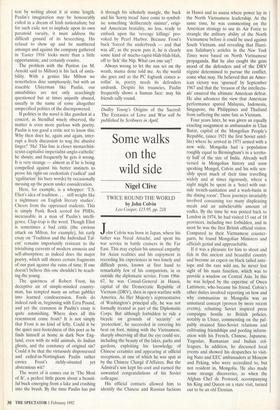Some walks on the wild side
Nigel Clive
TWICE ROUND THE WORLD by John Colvin Leo Cooper, £15.95, pp. 218 John Colvin was born in Japan, where his father was Naval Attache, and spent his war service in battle cruisers in the Far East. This may explain his unusual empathy for Asian realities and his enjoyment in recording his experiences in two lonely and difficult posts, known at first hand to remarkably few of his compatriots, in or outside the diplomatic service. From 1966- 67, he was Consul-General in Hanoi, capital of the Democratic Republic of Vietnam (DRV), then in open warfare with America. As Her Majesty's representative of Washington's principal ally, he was not formally treated as part of the Diplomatic Corps. But although forbidden to ride a bicycle on grounds of 'security' or 'protection', he succeeded in covering his beat on foot, mixing with the Vietnamese, sharply observing all that the eye could see, including the beauty of the lakes, parks and gardens, exploiting his knowledge of Chinese ceramics and appearing at official receptions, at one of which he was spat at by the Chinese Chargé d'Affaires. But the Admiral's son kept his cool and earned the unwanted congratulations of his Soviet colleague.
His official contacts allowed him to identify the Chinese and Russian factions
in Hanoi and to assess where power lay in the North Vietnamese leadership. At the same time, he was commenting on the American strategy to use its Air Force to strangle the military ability of the North Vietnamese before it could be used against South Vietnam, and revealing that Harri- son Salisbury's articles in the New York Times were based on North Vietnamese propaganda. But he also caught the grim mood of the defenders and of the DRV regime determined to pursue the conflict, come what may. He believed that an Amer- ican victory was 'spurned' by September 1967 and that the 'treason of the intellectu- als' ensured the ultimate American defeat. He also advances the view that American performance spared Malaysia, Indonesia, Singapore, the Philippines and Thailand from suffering the same fate as Vietnam.
Four years later, he was given an equally exacting assignment as ambassador in Ulan Bator, capital of the Mongolian People's Republic, (since 1921 the first Soviet satel- lite) where he arrived in 1971 armed with a new wife. Mongolia had a population roughly equal to Birmingham's in a territo- ry half of the size of India. Already well versed in Mongolian history and soon speaking Mongol, Colvin and his wife sen- sibly spent much of their time travelling widely and at times rigorously, where a night might be spent in a 'hotel with out- side trench-sanitation and a wash-basin in the dining room'. These journeys invariably involved consuming too many displeasing meals and an unbelievable amount of vodka. By the time he was posted back to London in 1974, he had visited 15 out of 18 provinces, including two forbidden, and in most he was the first British official visitor. Compared to their Vietnamese counter- parts, he found Mongolian Ministers and officials genial and approachable.
If it was a pleasure for him to shoot and fish in this ancient and beautiful country and become an expert on black tailed ante- lope and the rare wild ass, he never lost sight of his main function, which was to provide a window on Central Asia. In this he was helped by the expertise of Owen Lattimore, who became his friend. Colvin's other duties involved reporting on how and why communism in Mongolia was an unnatural concept (proven by more recent events), rebutting Soviet inspired press campaigns hostile to British policies, notably in Ulster, commenting on the pal- pably strained Sino-Soviet relations and cultivating friendships and pooling inform- ation with his French, Chinese, Japanese, Yugoslav, Rumanian and Indian col- leagues. In addition, he discussed local events and showed his despatches to visit- ing Nato and EEC ambassadors at Moscow and Peking, who were accredited to, but not resident in, Mongolia. He also made some strange discoveries, as when the Afghan Chef de Protocol, accompanying his King and Queen on a state visit, turned out to be an old Etonian.


















































 Previous page
Previous page